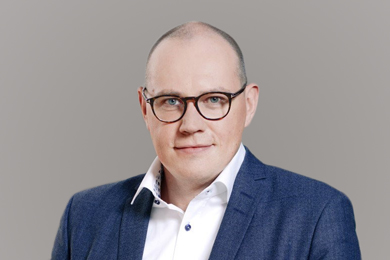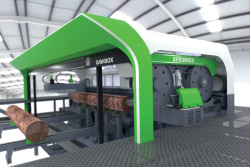Strong demand in the sawn timber market
The new Senior Vice President of Business at UPM Timber, Aki Temmes, estimates that the demand for sawn timber remains at a healthy level, even though the peak of the economic cycle might have been reached last year.
“We made good deals and the volumes moved very well in the first quarter of 2019.”
In Finland, UPM Timber consists of four sawmills with a total capacity of over 1.5 million cubic metres. UPM Kaukas sawmill is the largest, producing over 500,000 cubic metres of sawn timber per year.
A lot of UPM Timber’s production is sold domestically in Finland. “After Finland come China, Japan and the UK,” Temmes explains.
Even though the sawn timber trade was brisk during the beginning of the year, there are uncertainties in the global economy that could also weaken the outlook for sawmills. The principal concerns are related to the trade war between China and the United States, and the effects of Brexit.
“Since we cannot affect the global market, we must do our best in business. We have a clear strategy, high-performance sawmills and professional sales — all the necessary components for successful business. We intend to be a reliable partner to our customers in the future, too,” promises Temmes.
Efficient sawmills
In 2012, UPM decided to stop the further processing of sawn timber and to concentrate on sawing alone. Since this decision, the sawmills have been running at full speed.
“Since then, we have operated the sawmills based on the full-run strategy. There have been no market-related limitations on production. This sets us apart from most of our competitors,” says Temmes.
He states that industrial operations such as the sawmill industry are most efficient when the facilities are in full use.
“All wood that arrives at our sawmills is carefully used for production. Not even a single stick is wasted. Sawn timber generates value: wood chips, sawdust and other by-products are used for pulp, paper and energy production,” Temmes clarifies.
A sustainable product with a bright future
UPM sells most of its sawn timber to industrial customers in the furniture, construction and packaging sectors, or to customers for various further processing procedures.
“The range of customers and end-uses for our product is extensive. UPM Timber aims to establish and maintain international long-term partnerships. From the standpoint of future challenges, we are a great partner with a solid foundation, and we concentrate on our core capability: producing sawn timber for the right end-use applications at the right time,” says Temmes.
All UPM sawn timber is certified according to the FSC or PEFC certification schemes.
“Customer and market preferences vary, and we can use both certificates flexibly.”
Temmes believes that the future of sawn timber is bright.
“Our product is amazing. Sawn timber binds carbon throughout its lifecycle, which can last for hundreds of years. It is produced in a responsible and environmentally friendly way and it meets all the sustainability requirements.”
Aki Temmes emphasises that the quality of the end-product is based on the production expertise, good forestry and close collaboration with forest owners.
“We naturally aim to be able to provide our customers with added value and bring peace of mind and flexibility to their operations. We will succeed in providing sustainably produced Finnish sawn timber at a consistently high standard, as well as excellent service,” Temmes concludes.
Photo: Aki Temmes – Senior Vice President of Business
UPM Timber welcomed Aki Temmes, 41, to the position of Senior Vice President of Business in late April. He transferred to the position of head of UPM Timber from the position of Vice President of Business Control at UPM Biorefining. Aki has worked at UPM for over 16 years; in addition to Biorefining, he has worked in the Paper Business, UPM Timber and Wood Sourcing.
“I am excited to return to UPM Timber after being away for about six years. A lot of good work has been done at Timber under the supervision of my predecessors, and the business operations have improved significantly over the past few years,” Aki says.







